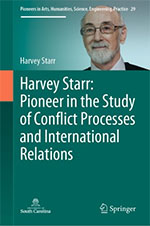
|
Harvey Starr: Harvey Starr: Pioneer in the Study of Conflict Processes and International Relations. Pioneers in Arts, Humanities, Science, Engineering, Practice (PAHSEP), No. 29 (Cham: Springer International Publishing, 2021).
ISBN (Hardcover): 978-3-030-78906-0
ISBN (Softcover):
ISBN (MyCopy): 978-3-030-78908-4
Order this book on Springer Website
|
- There are no similar books. This provides the most complete treatment of the work and contributions of Harvey Starr a former President of the International Studies Association, which is the largest organization of specialists in International Relations (IR). It provides key examples of the major themes in his scholarship.
- Important for contemporary students of international relations, and their understanding of IR theory and methods.
- Demonstrates an eclectic linking of theoretical, logical, and empirical approaches to the study of IR—providing a critical logic of inquiry to do research.
- Provides insights and blueprints for how to develop interdisciplinary and multidisciplinary scholarship, with Starr’s work highlighting geography and social-psychology.
- Affords graduate students and newly minted Ph.D.s guidance in the development of research, becoming a professional, and the choices to be made in one’s academic career.
This book sets out, through Starr’s personal story, his interest in how the ideas of “intellectual trajectories” and “political memories” could be incorporated into intellectual autobiography, thus exploring how the personal lives of individual academics intersected with their professional interests. By following the development of his approach to research, interdisciplinarity, the logic of inquiry, and the opportunity and willingness framework scholars and researchers will see how his groundbreaking research in Conflict Processes and International Relations Theory developed and were interlinked (especially diffusion, geography and spatiality; the democratic peace and integration; decision making). In addition, graduate students and junior faculty should find useful hints about how to navigate their way through the complexities of becoming both a professional and successful academic and scholar.
- This book provides the most complete treatment of the work and contributions of Harvey Starr, a former President of the International Studies Association.
- Important for contemporary students of international relations, and their understanding of IR theory and methods.
- Demonstrates an eclectic linking of theoretical, logical, and empirical approaches to the study of IR—providing a critical logic of inquiry to do research.
- Provides insights and blueprints for how to develop interdisciplinary and multidisciplinary scholarship, highlighting geography and social-psychology.
- Affords graduate students and recent Ph.D.s guidance in the development of research, becoming a professional, and the choices to be made in one’s academic career.
Keywords: Intellectual trajectories, Political memories, Opportunity and willingness, Critical logic of inquiry, Substitutability, Political geography, spatial theory and analysis, diffusion analysis, interdisciplinarity
Author’s affiliation
Harvey Starr, Department of Political Science, University of South Carolina, Columbia, USA
About the author
Harvey Starr (Yale University Ph.D. 1971) is the Dag Hammarskjöld Professor in International Affairs Emeritus in the Department of Political Science at the University of South Carolina. After 25 years at South Carolina and 43 years in the discipline, he retired in June 2014. Professor Starr served as Chair of the Department at USC from 1998-2006; he previously served as Department Chair at Indiana University from 1984-1989. He has also taught at the University of Aberdeen, Scotland, and the Australian National University. He has been president of the Peace Science Society (International), vice president of the American Political Science Association, president of the Conflict Processes Section of the APSA, as well as vice president and president of the International Studies Association. He has served as editor of International Interactions (1991–2000) and associate editor of the Journal of Politics (2001–2003). Professor Starr specializes in international relations theory and methods, international conflict, geopolitics and spatial analyses, foreign policy analysis, and language and politics. He is the author or co-author of 19 books and monographs and almost one hundred journal articles and book chapters. He has been awarded numerous grants, including three from the National Science Foundation. In 1998, he was the recipient of the USC’s Russell Award for Research in Humanities and Social Sciences. In 2015 he received the Lifetime Achievement Award from the Conflict Processes Section of the American Political Science Association “in recognition of scholarly contributions that have fundamentally improved the study of conflict processes.” |